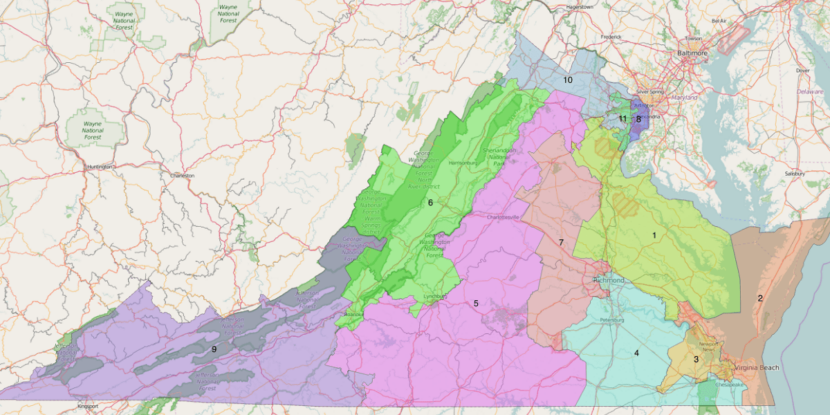It’s hard to underestimate the importance of the statewide elections in Virginia in 2017. Virginia is the epitome of a purple battleground state, with Democrats dominating the densely populated Washington, D.C., suburbs in Northern Virginia, and Republicans dominating pretty much everywhere else. As one of two states to have constitutionally-required statewide elections every year, it’s the place to be for political junkies.
The results of the November elections will be a referendum on President Donald Trump and Republican control of Congress. Republican Bob McDonnell won the governorship in 2009 partly as a repudiation of Obama’s first year in office, in one of the first electoral victories for the Tea Party movement. Republicans swept statewide that year, winning all three statewide offices (Governor, Lieutenant Governor, and Attorney General).
Unfortunately, Republicans have not won any statewide races since 2009. In 2013, the Republican National Committee chose to spend millions of dollars in New Jersey to help Chris Christie cruise to re-election, while Republican gubernatorial candidate Ken Cuccinelli was hung out to dry in Virginia. But the Obamacare exchanges and healthcare.gov launched a month before the election, and Cuccinelli closed a 10-point polling gap, effectively tying the race in the homestretch. He ended up losing by just two-and-a-half points to Terry McAuliffe. GOP Attorney General candidate Mark Obenshain lost by 0.04 percent that same year. And in 2014, Republican U.S. Senate nominee Ed Gillespie was similarly neglected by the national party and came within 0.8 percent of knocking out Mark Warner in what would have been the biggest upset of the year. So Virginia has been the land of heartbreak for conservatives in recent years.
All has not been lost, however. Republicans have retained a supermajority of over 65 out of 100 seats in the state House of Delegates. And Republicans held a 20-20 tie with Democrats over control of the state Senate after McAuliffe was elected, which turned into a 21-19 majority just a few months into McAuliffe’s term. This has prevented McAuliffe from getting many of his legislative priorities done, such as expanding Medicaid in the state as part of Obamacare.
But McAuliffe has governed as a hard leftist. He illegally restored voting rights to 200,000 felons, many of them convicted of violent crimes such as murder and rape. When the Virginia Supreme Court struck his action down, he defied them and used an autopen to individually restore voting rights to 60,000 felons in time to vote in 2016. He gutted the state’s health and safety regulations on abortion clinics, preferring to let women go into unsafe and unsanitary conditions — so much for “safe, legal, and rare.” He vetoed a bill to defund Planned Parenthood and another bill protecting religious freedom. The list goes on and on.
His cohorts, Lt. Governor Ralph Northam and Attorney General Mark Herring, have been just as far left. Northam has been a fierce partisan, and since the Lt. Governor casts the tie-breaking vote in the Senate, he has played a major role in legislation with such a slim majority. Herring’s first act in office was to do the exact opposite of his job description by attacking Virginia law. The voter-approved constitutional amendment protecting the definition of marriage as between one man and one woman was in federal court that year. Not only did Herring refuse to defend the law, he joined the other side and attacked it in court, in a flagrant violation of all legal ethics.
Virginia Republicans are tired of losing and want to take back control of the state government. National Democrats are going to pour millions of dollars into Virginia in 2017, hoping a win will undermine the national Republican agenda going into the critical national midterm elections 2018.
But there are solid candidates running for the Republican nominations for Governor, Lt. Governor, and Attorney General. Next week, we’ll take a look at the candidates.
Photo via Wikimedia Commons, CC BY-SA 4.0


